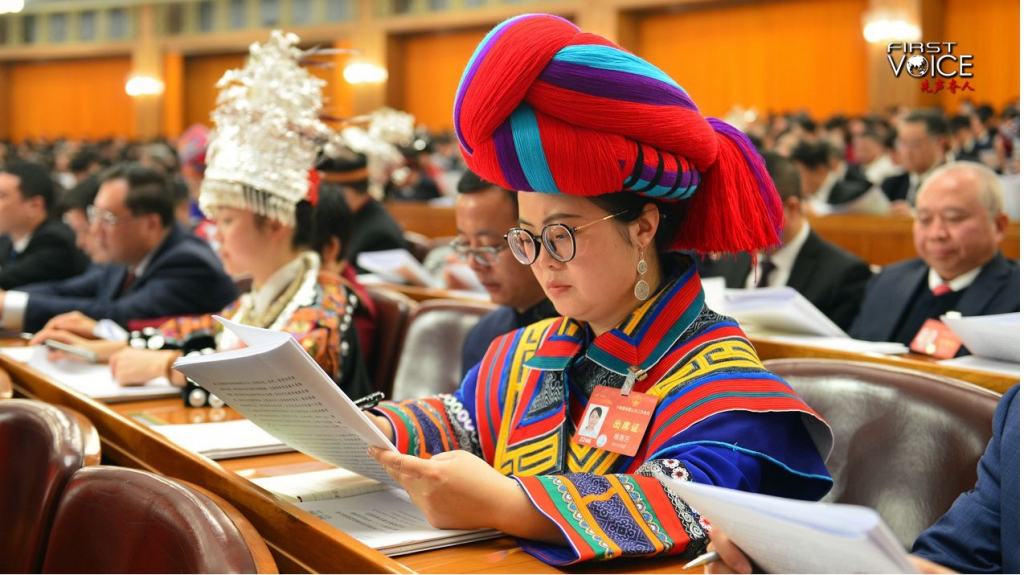Published: September 27,2024
By Bojana Pavlovic

The second session of the 14th National People’s Congress opens at the Great Hall of the People, Beijing, March 5, 2024. /CFP
China has followed its own path, especially since 1949. The People’s Republic of China has charted a successful course of political and economic development. Yet, the West often struggles to acknowledge China’s unique system, instead imposing a Eurocentric lens that measures the world by Western democratic ideals. The question is not about the merits of one system over another, but whether the West can respect China’s right to choose its own governance model – specifically, China’s whole-process people’s democracy.
This lack of respect stems from entrenched Eurocentrism. Western scholars and policymakers frequently critique non-Western systems as inferior or illegitimate, often without fully understanding the historical, cultural and societal contexts that shape them. John King Fairbank, a renowned China historian, noted that Chinese history is best understood by the Chinese, just as Western history is best understood by those in the West. These distinct perspectives often lead to misunderstandings.
Western interpretations of China, as Paul A. Cohen highlighted in his book “Discovering History in China,” have long been skewed by a Eurocentric worldview. This view portrays China as a “pariah” that does not align with Western notions of civilization. Scholars like Min Pun, associate professor from Nepal’s Tribhuvan University, argue that Western academia created the concept of the “Orient” to define Eastern societies as uncivilized and inferior. This framework allowed Western powers to justify colonial dominance and remains embedded in modern Western thinking. Even today, remnants of this colonial mindset shape how Western media and policymakers discuss China’s political system.
The Western narrative often insists on the superiority of liberal democracy, arguing that individual freedom is the ultimate measure of a successful political system. However, this view disregards the fact that different cultures have different priorities and governance models. China’s whole-process people’s democracy is rooted in the country’s unique cultural, historical and societal context. It emphasizes social harmony and collective well-being, values deeply embedded in Chinese philosophy. In contrast to Western individualism, China’s approach focuses on the common good.
The West’s critiques of the Chinese system often come with an air of arrogance, assuming that its model of democracy is universal. Yet, Western democracy is also a product of specific historical and societal conditions. It cannot simply be transplanted to other regions with different cultural values. Western liberal democracy is not the sole path to a fair and just society, nor is it the only valid form of governance.
This lack of respect for China’s political system reflects a broader problem in how the West approaches non-Western cultures. Western societies tend to view directness and individual expression as universally positive traits, often overlooking the fact that many non-Western cultures prioritize politeness, respect and social harmony in communication. These cultural differences extend to political discourse. In China, public debate is often more restrained and collective in nature, whereas Western democracy thrives on adversarial politics and individualism. The West’s inability to appreciate these differences results in distorted views of China’s governance system.
cgtn.com

A voter casts a vote during the 2020 presidential election, Flint, Michigan, November 3, 2020. /CFP
When discussing democracy, it is essential to recognize that different political systems emerge from different cultural and historical contexts. China’s whole-process people’s democracy is a reflection of its traditions, emphasizing long-term stability, social harmony and collective progress. While Western democracy may prioritize individual rights and short-term political cycles, China’s system aims for gradual, sustained development. This difference does not make one system superior to the other; rather, it highlights the need for mutual respect and understanding.
Criticism of China’s system often ignores the fact that many Chinese people are satisfied with their government. Surveys and research consistently show strong support for China’s political system, with the country’s rapid economic growth and improving living standards cited as key reasons. While Western critics focus on the lack of multiparty elections, Chinese citizens appreciate the government’s ability to deliver results that improve their lives. China’s model of governance, with its emphasis on meritocracy and long-term planning, has been central to the country’s success over the past 75 years.
Chinese scholars often argue that Western-style elections, with their emphasis on confrontation and division, are unsuitable for Chinese society. Some point out that, in Chinese culture, social harmony is highly valued, and contentious political campaigns would be seen as disruptive and counterproductive. In contrast to the West, where elections often pit opposing interests against each other, Chinese governance focuses on consensus-building and collective decision-making. This approach aligns with the Confucian philosophy that underpins much of Chinese political thought, which stresses the importance of harmony and the common good.
Western politicians, on the other hand, often exploit divisive issues to win votes. In Chinese culture, such behavior would be viewed as self-serving and harmful to the collective. The Chinese system, by contrast, prioritizes stability and the well-being of society as a whole. This difference in political culture is a key reason why Western-style democracy does not resonate with many Chinese citizens.
China’s political system, like any other, is not without its challenges. However, it is essential to recognize that China is constantly evolving and adapting its governance model to suit its needs. Just as Western democracies have developed over time, so too has China’s whole-process people’s democracy. The country has undergone tremendous transformation in recent decades, and its political system reflects the unique circumstances of its development.
Ultimately, the West must learn to respect China’s right to choose its own path. Rather than imposing its own values and systems on the rest of the world, the West should seek to understand and engage with China on its own terms. As Australian scholar Colin Mackerras rightly points out, ignorance of China comes at a high cost. If the West fails to appreciate China’s history, culture and political system, it risks missing the opportunity to build constructive and respectful relations with one of the world’s most important nations.
China’s whole-process people’s democracy is a legitimate and successful governance model that reflects the country’s unique history and culture. The West should move beyond its colonial mindset and learn to respect China’s right to govern itself according to its own values
 Africa -China Review Africa -China Cooperation and Transformation
Africa -China Review Africa -China Cooperation and Transformation
